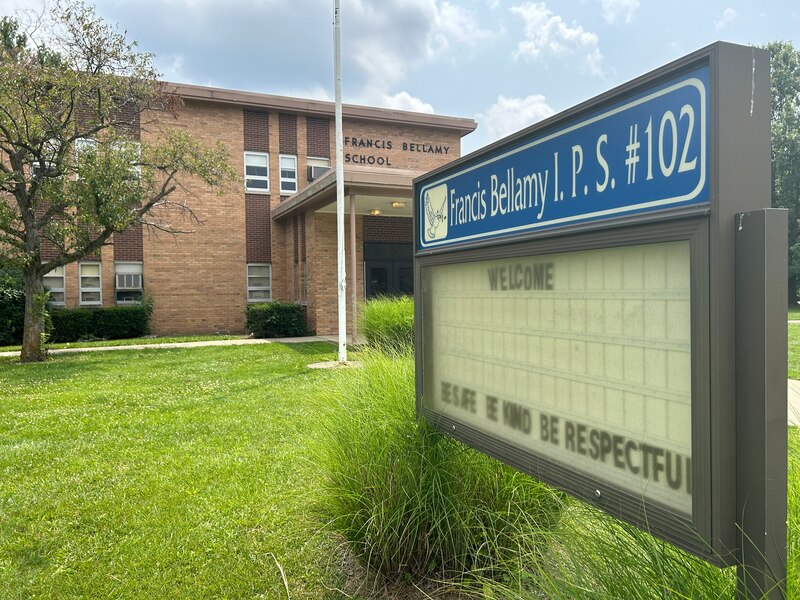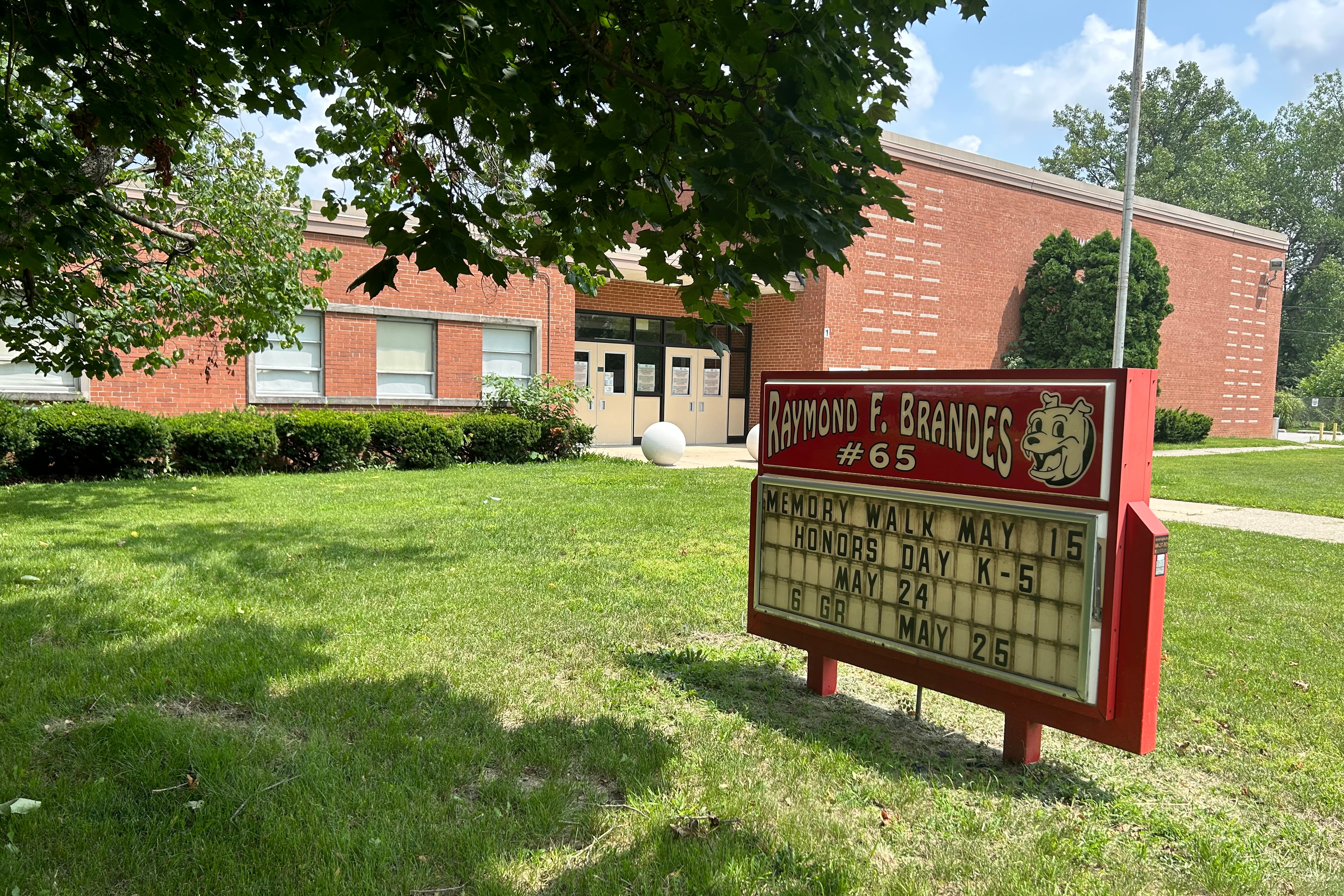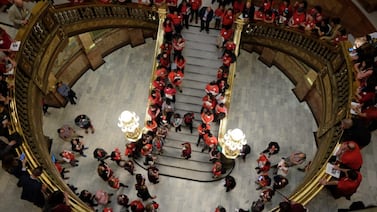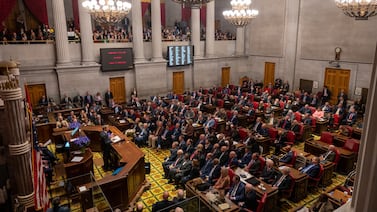Sign up for Chalkbeat Indiana’s free daily newsletter to keep up with Indianapolis Public Schools and statewide education news.
Indianapolis Public Schools says its planned sale of two school buildings that closed this year is exempt from a state law designed to make such district facilities available to charter schools for $1.
The school board on Thursday voted unanimously to authorize officials to begin the sales process for Raymond Brandes School 65 and Francis Bellamy School 102, two of the six schools that closed at the end of the 2022-23 school year as part of the district’s Rebuilding Stronger reorganization.
But the district will only consider transferring the properties to another government agency or selling them to a nonprofit organization for the first 30 days of the process before opening up the sales to other buyers.
The state’s so-called $1 law in general requires districts to make such buildings available to charter schools or state educational institutions for a sale price or annual lease of $1. But IPS maintains that changes to the statute that lawmakers approved earlier this year mean the law does not apply to its sale of the two facilities. That interpretation of the law has garnered pushback from charter supporters.
The district’s argument underscores an ongoing conflict between IPS, charters, and GOP officials over the best way to use and reallocate school facilities as IPS enrollment declines and the district looks to shore up its finances.
Charter schools had previously expressed interest in occupying some of the six buildings closed this year, including Adelante Schools, which had hoped to start a second school at School 65. Last year, the Indiana Charter School Network filed a complaint with Indiana Attorney General Todd Rokita’s office that IPS had failed to comply with the $1 law by not making the six schools it planned to close available to charters. Rokita’s office later ruled in favor of the district.
State lawmakers revised the $1 law in their most recent session to allow the Indiana Department of Education to force the closure of schools operating at less than 60% capacity in districts that have lost at least 10% of their students in the past five years. Once closed, districts must offer to sell or lease those schools to charters. That change gave charters a new edge, at least in theory.
Yet the revised law also exempts districts from having to sell or lease closed buildings to charters if they share funding from voter-approved property tax increases for operating or safety costs with “applicable charter schools.”

In 2021, the IPS school board voted to share funds from its 2018 property tax increase with charters in its Innovation Network of autonomous schools. On Thursday, the district in its resolution cited that revenue-sharing to argue that it is exempt from having to sell or lease its closed buildings to charters for $1.
“In 2023, there were significant modifications to the so-called dollar law that we believe exempt IPS from” the statute, the district said in a statement after the vote. “Our legal team will continue to engage in the analysis and implications moving forward.”
But Sen. Linda Rogers, a Republican and the author of the change to the $1 law, previously told Chalkbeat that the exemption would not cover IPS just because the district had shared funds from a previous referendum.
Instead, she argued, the exemption only covers districts that share such revenue with charters through measures that voters approve this year or in subsequent years. (In fact, under a separate state law, IPS and other Marion County school districts will be required to split revenue in this way with charters for any future ballot question that voters pass.)
“We don’t think IPS has met the requirement of the statute to share property tax dollars proportionately with all charter schools in the IPS boundaries, and thus the action they are taking violates the law,” Marcie Brown-Carter, executive director of the Indiana Charter School Network, said in a statement before the vote on Thursday.
Superintendent Aleesia Johnson said the directive to prioritize a sale or transfer to a nonprofit or government agency will give “mission-aligned organizations … the opportunity at the front of the line” to acquire the buildings.
VOICES, a nonprofit that offers youth programs, told the school board that the space at School 102 would allow it to grow.
Circle City Prep founder and executive director Megan Murphy told Chalkbeat that the school is also interested in pursuing a partnership with IPS to use School 102 for a second campus as the charter school grows. But she said the school is not interested in purchasing the building at this time, even for $1.
Both School 65 and School 102 were built in the early 1960s and had low utilization rates in the 2022-23 school year. School 102 on the far eastside operated at just 24% capacity, and School 65 operated at 45% capacity. The sale price for these buildings is not yet determined.
School 102, which housed a prekindergarten center and the Step Ahead Academy for students who had been retained, was given a building condition score of “poor” in a third-party assessment. School 65 was rated as “fair.”
Although the district had discussions with Adelante about potentially occupying School 65, IPS Chief Operations Officer Bill Murphy said the neighborhood in the south side area would not have sustained a second Adelante campus. Adelante, a charter school in the Innovation Network that operates in the district’s Emma Donnan Elementary and Middle School building, has an enrollment that only uses 35% of the capacity available in that building, Murphy added.
“We really want to make sure that they have an opportunity to thrive,” he said. “When we looked at the projections, splitting them in between two campuses, for example, would have engineered their failure in at least one.”
Adelante Executive Director Eddie Rangel declined to comment on the plan to sell the buildings.
School for the blind to lease two other closed schools
Board members also approved lease agreements with the Indiana School for the Blind and Visually Impaired (ISBVI) to occupy two other schools that closed this year as part of Rebuilding Stronger.
ISBVI will pay $8,885 per month to occupy Floro Torrence School 83 in the northeast part of the district through July 2030, while its campus undergoes renovations. The school will pay $13,845 per month for George Buck School 94 on the far eastside.
Paul Miller School 114, which also closed this year, will serve as a new campus for the Excel Center adult charter high school. The district is still working on plans for Francis W. Parker Montessori School 56, the sixth school to close under the reorganization.
Correction: This article has been updated to accurately describe the state law governing the lease or sale of closed and underused school buildings to charter schools and education institutions under certain circumstances.
Amelia Pak-Harvey covers Indianapolis and Marion County schools for Chalkbeat Indiana. Contact Amelia at apak-harvey@chalkbeat.org.





